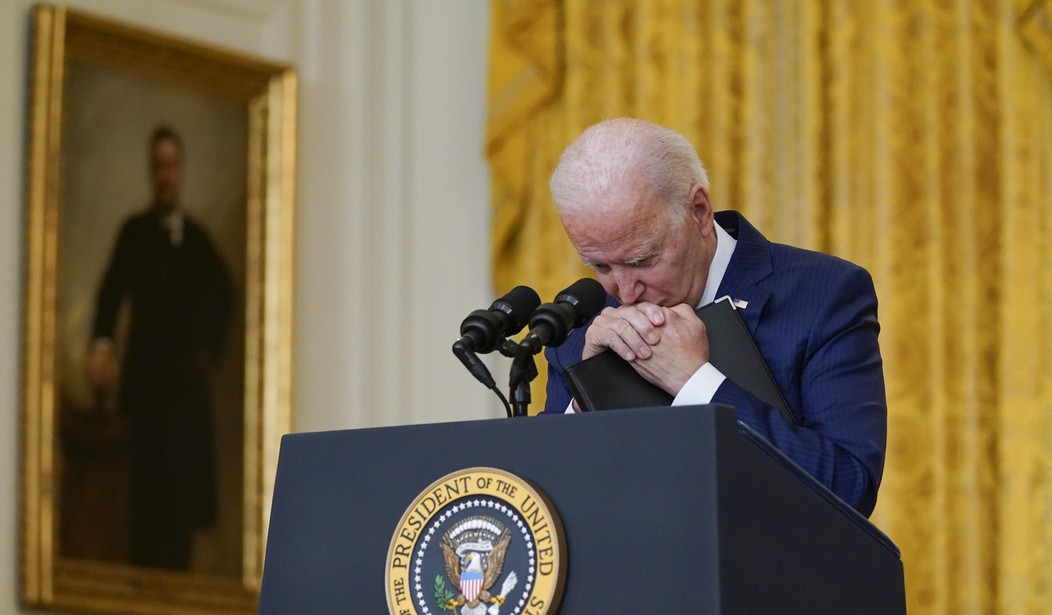This is a new low for him as measured by Marist but not his lowest number overall to date. Remember that 41 percent stinker from Suffolk a few weeks ago?
It’s strange that he continues to pile up such terrible polling given what an “extraordinary success” his evacuation effort supposedly was, no?
Maybe it’s a blip. American voters will move on from Afghanistan soon, eager to forget an aimless 20-year war and possibly unwilling to confront the consequences of withdrawal when the media periodically tries to remind them with stories of Afghan allies being murdered. But Dems have to feel itchy knowing that Biden is now momentarily rocking the same job approval that Trump typically carried over his four years in office.

Nearly as many Americans *strongly* disapprove of his job performance, 41 percent, as approve. In the span of a month he went from 46 percent approval among independents to 36 percent. Two days ago, Bill Kristol claimed that many of his Biden-voting (and presumably mostly hawkish centrist) friends had soured on the president lately. That was an anecdote. But Marist’s data backs it up.
The numbers on withdrawal from Afghanistan are particularly ugly, Biden’s heavy breathing about what a triumph the airlift was notwithstanding:

Anytime you’re at 70+ percent disapproval among independents — on any issue — you’re in trouble. Per RCP’s poll of polls, Biden’s in trouble:

FiveThirtyEight’s average also has him underwater but by a narrower 46.2/47.9 margin.
What does his downturn in the polls portend for the midterms? RCP’s Sean Trende writes today about the correlation between key variables and the governing party’s performance in elections past. Rarely does the party in power gain seats in a midterm but whether they lose small or lose big depends on certain factors. How “overextended” are they by having pulled upsets in the last election in districts typically won by the other party? Have voters seen their personal income increase or decrease since the previous cycle? Most importantly, how popular is the president? More than anything, midterms tend to be referendums on his performance. Is he doing a good job or bad?
The results of previous elections show us that it doesn’t take much of a change in presidential job approval for the in-party to shift from expecting modest losses in the midterm to expecting a major wave. Biden’s decline of late is skidding towards wave territory, Trende notes:
At 46% [approval]? Democrats would lose between four and zero [Senate] seats 95% of the time, with an expected outcome of two seats. They only retain control about 4% of the time. This is obviously an outcome Democrats would like to avoid…
Democrats begin this cycle with a relatively low degree of exposure [in the House], consistent with a loss of 18 seats or so…
[T]he decline in President Bidens’ job approval from around 52% to 46% is consistent with a loss of an additional 5% of the Democrats’ caucus, or an additional 11 seats…
Right now, he is probably sitting just below the “Mendoza line” that would represent a “normal” midterm, with perhaps no Senate losses and low double-digit House losses. If the president rebounds, Democrats will have a successful 2022, even if they narrowly lose the House. If he declines much further, however, it could turn into an ugly rout.
Trump was averaging around 44 percent approval at the start of November 2018, when Americans sent a blue wave to flip the House. That’s higher than Biden’s number in today’s Marist poll.
I’ll leave you with two other numbers from the survey. Asked whether the U.S. has a duty to continue its involvement in Afghanistan or whether Afghanistan must determine its future without U.S. involvement, Democrats split 18/71 while independents split 25/66. Republicans, who twice nominated an “end endless wars” candidate for president, split … 48/44. And when offered options on how the U.S. should have withdrawn, just 19 percent of Republicans said all troops should have left. (Among Democrats, 54 percent said so.) Forty-six percent of Republicans preferred to withdraw *some* troops while leaving a force behind and another 19 percent thought we shouldn’t have withdrawn any. Nine percent actually wanted to send more! As much as it may break Trump’s heart to hear it, the GOP is still a party of hawks. At least when there’s a dovish Democrat in the White House to rally against.








Join the conversation as a VIP Member